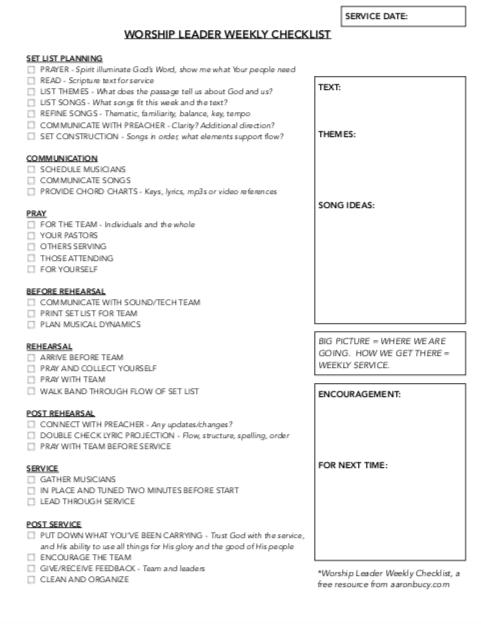Last week I wrote about four categories of preparation: our hearts, the music, the team, and the rehearsal. In my experience, I believe teams and leaders - at least conceptually - understand the importance of the first three categories. But teams and leaders do not invest as much time and energy into preparing for rehearsals. I think this is because we see rehearsals as a necessary evil - the purpose and point of rehearsals being exclusively musical. When we view rehearsals as only preparation for the musical aspect of our team, we miss the opportunity to disciple, grow a sense of community, cast vision, encourage and equip our team to lead and serve as worship leaders on and off the platform.
As a worship leader, I believe there are a number of ways we can prepare personally, practically, and spiritually to create a rehearsal that is more than a necessary evil:
Prepare during the week. Play through the songs, familiarize yourself with the songs, structure, and transitions. Consider the team that will be playing and leading together, think through potential dynamics, parts, and opportunities to allow others to bring their skill, creativity, and heart to the setlist.
Communicate expectations. What time does rehearsal start? Do you want musicians to memorize music? Will music be provided, or do musicians need to come prepared with their chord charts and lyrics? Are there specific parts you’d like musicians to learn? As Brene Brown says, ‘Clear is kind.’ When we communicate expectations to the team, it avoids unnecessary frustration or unmet expectations during the rehearsal and helps solidify the culture of the team and rehearsal.
Be the first to arrive. As worship leaders part of our responsibility is to host the team. Arriving before the team gives us the opportunity to ready ourselves and the space, so we are present and able to greet and engage the team as they arrive. Get yourself warmed up, set up your instrument, finalize any small details, and quiet and prepare your own heart to host the team, and lead the rehearsal.
Lead the team spiritually, not just musically. Spend time praying together, reading Scripture, talking through the song choices, and how they are connected to the sermon and the series. Lead the team through a devotional. I put together a 52-week devotional for worship leaders and teams that you can download for free, here.
Walk the team through the setlist. Talk through not only the order of the setlist but the order of the songs. Communicate your ideas for the dynamics of each song and the setlist overall. As you start each song, go over the song structure and dynamics again. Once you’ve finished, make sure that everyone feels comfortable and is clear on parts and transitions.
Save new songs for the end of the rehearsal. This gives you the opportunity to get through songs that are more familiar, without consuming all of your rehearsal time working on a new song. You can always drop a new song that needs more preparation. But if you spend your whole rehearsal trying to ready one song without getting through the entire setlist, it can leave the team and the morning feeling a bit shaky.
Musicians hold instruments. Musicians love to play, put an instrument in their hand and it takes a great deal of self-control not to play constantly. But when someone is giving direction or vocalists are trying to work through parts, or musicians are trying to confirm chord changes, everyone needs to hold their instrument and/or tongue. This is both a show of respect to the team, but also cuts down on noise and confusion, helping the rehearsal to move efficiently.
Someone needs to make the final call. Whether the structure of a song, parts, and dynamics, or decisions about what to add or cut, someone needs to make the final call. Often this is the person responsible for leading worship that morning, but it does not have to be. But it is important that the team that morning understands who has the final say, and know-how to respectfully voice opinions, and humbly defer when a final decision has been made.
Rehearsals are necessary, but they do not have to be evil. We can steward them wisely to host our team, prepare the music, ready our hearts, and worship through song - even in our preparation.
